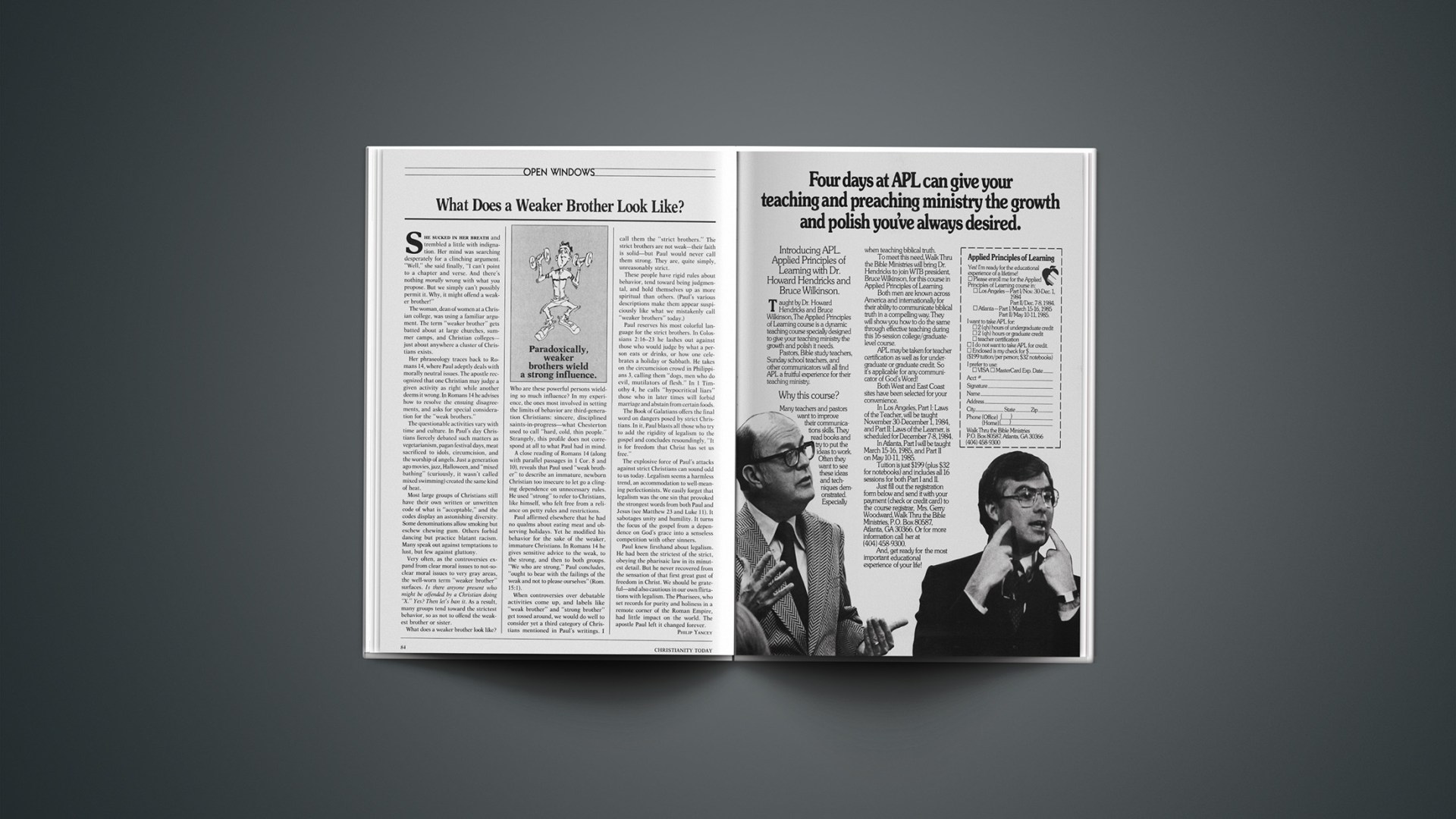She sucked in her breath and trembled a little with indignation. Her mind was searching desperately for a clinching argument. “Well,” she said finally, “I can’t point to a chapter and verse. And there’s nothing morally wrong with what you propose. But we simply can’t possibly permit it. Why, it might offend a weaker brother!”
The woman, dean of women at a Christian college, was using a familiar argument. The term “weaker brother” gets batted about at large churches, summer camps, and Christian colleges—just about anywhere a cluster of Christians exists.
Her phraseology traces back to Romans 14, where Paul adeptly deals with morally neutral issues. The apostle recognized that one Christian may judge a given activity as right while another deems it wrong. In Romans 14 he advises how to resolve the ensuing disagreements, and asks for special consideration for the “weak brothers.”
The questionable activities vary with time and culture. In Paul’s day Christians fiercely debated such matters as vegetarianism, pagan festival days, meat sacrificed to idols, circumcision, and the worship of angels. Just a generation ago movies, jazz, Halloween, and “mixed bathing” (curiously, it wasn’t called mixed swimming) created the same kind of heat.
Most large groups of Christians still have their own written or unwritten code of what is “acceptable,” and the codes display an astonishing diversity. Some denominations allow smoking but eschew chewing gum. Others forbid dancing but practice blatant racism. Many speak out against temptations to lust, but few against gluttony.
Very often, as the controversies expand from clear moral issues to not-so-clear moral issues to very gray areas, the well-worn term “weaker brother” surfaces. Is there anyone present who might be offended by a Christian doing “X.” Yes? Then let’s ban it. As a result, many groups tend toward the strictest behavior, so as not to offend the weakest brother or sister.
What does a weaker brother look like? Who are these powerful persons wielding so much influence? In my experience, the ones most involved in setting the limits of behavior are third-generation Christians: sincere, disciplined saints-in-progress—what Chesterton used to call “hard, cold, thin people.” Strangely, this profile does not correspond at all to what Paul had in mind.
A close reading of Romans 14 (along with parallel passages in 1 Cor. 8 and 10), reveals that Paul used “weak brother” to describe an immature, newborn Christian too insecure to let go a clinging dependence on unnecessary rules. He used “strong” to refer to Christians, like himself, who felt free from a reliance on petty rules and restrictions.
Paul affirmed elsewhere that he had no qualms about eating meat and observing holidays. Yet he modified his behavior for the sake of the weaker, immature Christians. In Romans 14 he gives sensitive advice to the weak, to the strong, and then to both groups. “We who are strong,” Paul concludes, “ought to bear with the failings of the weak and not to please ourselves” (Rom. 15:1).
When controversies over debatable activities come up, and labels like “weak brother” and “strong brother” get tossed around, we would do well to consider yet a third category of Christians mentioned in Paul’s writings. I call them the “strict brothers.” The strict brothers are not weak—their faith is solid—but Paul would never call them strong. They are, quite simply, unreasonably strict.
These people have rigid rules about behavior, tend toward being judgmental, and hold themselves up as more spiritual than others. (Paul’s various descriptions make them appear suspiciously like what we mistakenly call “weaker brothers” today.)
Paul reserves his most colorful language for the strict brothers. In Colossians 2:16–23 he lashes out against those who would judge by what a person eats or drinks, or how one celebrates a holiday or Sabbath. He takes on the circumcision crowd in Philippians 3, calling them “dogs, men who do evil, mutilators of flesh.” In 1 Timothy 4, he calls “hypocritical liars” those who in later times will forbid marriage and abstain from certain foods.
The Book of Galatians offers the final word on dangers posed by strict Christians. In it, Paul blasts all those who try to add the rigidity of legalism to the gospel and concludes resoundingly, “It is for freedom that Christ has set us free.”
The explosive force of Paul’s attacks against strict Christians can sound odd to us today. Legalism seems a harmless trend, an accommodation to well-meaning perfectionists. We easily forget that legalism was the one sin that provoked the strongest words from both Paul and Jesus (see Matthew 23 and Luke 11). It sabotages unity and humility. It turns the focus of the gospel from a dependence on God’s grace into a senseless competition with other sinners.
Paul knew firsthand about legalism. He had been the strictest of the strict, obeying the pharisaic law in its minutest detail. But he never recovered from the sensation of that first great gust of freedom in Christ. We should be grateful—and also cautious in our own flirtations with legalism. The Pharisees, who set records for purity and holiness in a remote corner of the Roman Empire, had little impact on the world. The apostle Paul left it changed forever.










